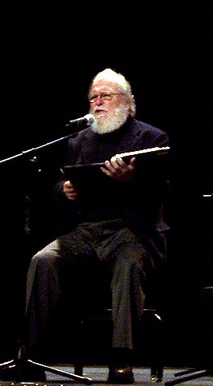
"Professor" Peter Schickele is an American composer, musical educator, and parodist, best known for comedy albums featuring his music, but which he presents as being composed by the fictional P. D. Q. Bach. He also hosted a long-running weekly radio program called Schickele Mix.
The Abduction of Figaro is a comic opera in three acts, described as "A Simply Grand Opera by P. D. Q. Bach", by Peter Schickele. It is a parody of opera in general, and the title is a play on two operas by Wolfgang Amadeus Mozart: The Abduction from the Seraglio, K. 384, and The Marriage of Figaro, K. 492. Those two operas, as well as Così fan tutte and Don Giovanni, and Gilbert and Sullivan's The Pirates of Penzance are among the core inspirations for the piece. The Abduction of Figaro is numbered S. 384, 492 in Schickele's catalogue of works.

Johann Ludwig Bach was a German composer and violinist.
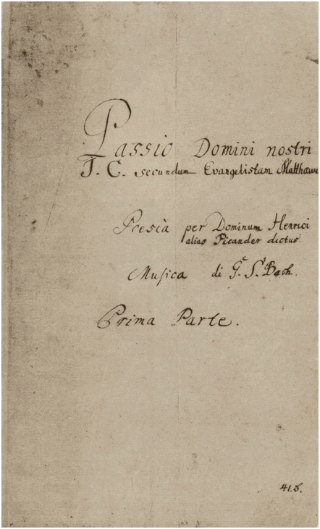
The St Matthew Passion, BWV 244, is a Passion, a sacred oratorio written by Johann Sebastian Bach in 1727 for solo voices, double choir and double orchestra, with libretto by Picander. It sets the 26th and 27th chapters of the Gospel of Matthew to music, with interspersed chorales and arias. It is widely regarded as one of the greatest masterpieces of Baroque sacred music. The original Latin title Passio Domini nostri J.C. secundum Evangelistam Matthæum translates to "The Passion of our Lord J[esus] C[hrist] according to the Evangelist Matthew".
Oedipus Tex is a satirical Western-themed oratorio by P. D. Q. Bach that follows the adventures of Oedipus Tex in Thebes Gulch. It was released on the album, Oedipus Tex and Other Choral Calamities in 1990.
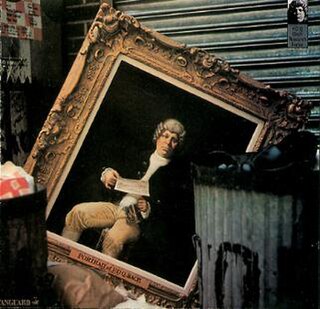
Portrait of P. D. Q. Bach was released in 1977 on Vanguard Records. The album features mostly the work of Peter Schickele writing as P. D. Q. Bach, with one contribution under his own name.

The Ill-Conceived P. D. Q. Bach Anthology is a collection of works by Peter Schickele writing as P. D. Q. Bach originally recorded on the Telarc label by the composer.

An Hysteric Return: P.D.Q. Bach at Carnegie Hall is live recording of a P. D. Q. Bach concert in Carnegie Hall and was released on Vanguard Records in 1966.

The Stoned Guest is "the premiere recording of the Half-Act Opera by P. D. Q. Bach", the pseudonym used by Peter Schickele for parodic works. It was released on Vanguard Records in 1970. The title is a play on Dargomyzhsky's opera The Stone Guest. The record is a pseudo-radio broadcast hosted by "Milton Host" including an appearance by "Paul Henry Lung" as a contestant on the intermission game "Opera Whiz" hosted by Schickele.

Black Forest Bluegrass is a recording of the music of Peter Schickele under his comic pseudonym of P. D. Q. Bach, featuring the composer and "a bluegrass band with a Baroque orchestra, a wind octet with toys, a commercial with a snake — this album has it all!" The album was released on Vanguard Records in 1979.
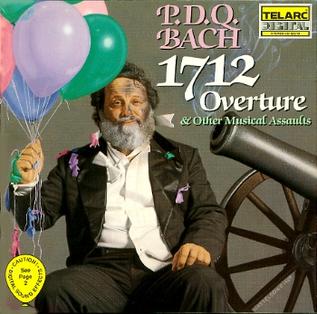
1712 Overture and Other Musical Assaults is a classical music album released in 1989 by Telarc Records. The album contains works by P. D. Q. Bach, the alter ego of Professor Peter Schickele. It is scored for "really big orchestra and some not-quite so big ensembles, plus unique on-location introductions, spoken on the very historical spots where the actual history happened".

The Wurst of P. D. Q. Bach is a collection of works by Peter Schickele under his comic pseudonym of P. D. Q. Bach originally recorded on the Vanguard Records label by the composer. It includes "lowlights" from four different Vanguard albums: An Evening with P. D. Q. Bach (1807–1742)?, An Hysteric Return: P.D.Q. Bach at Carnegie Hall, Report from Hoople: P. D. Q. Bach on the Air, and P. D. Q. Bach's half-act opera The Stoned Guest. Wurst is the German word for sausage, with the album cover photograph set in a sausage shop.
P.D.Q. Bach in Houston: We Have a Problem! is a live performance celebrating 40 years of P. D. Q. Bach. This performance features Professor Peter Schickele with Orchestra X conducted by Peter Jacoby. It includes never-before-recorded performances of "Trumpet Involuntary" movement of Iphigenia in Brooklyn, and also the rounds Odden und Enden.

Herr, gehe nicht ins Gericht mit deinem Knecht, BWV 105 is a church cantata by Johann Sebastian Bach. He composed it in Leipzig for the ninth Sunday after Trinity and first performed it on 25 July 1723. The musicologist Alfred Dürr has described the cantata as one of "the most sublime descriptions of the soul in baroque and Christian art".
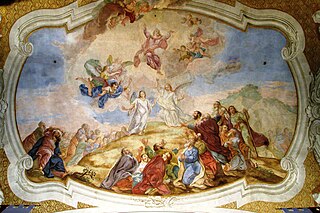
Gott fähret auf mit Jauchzen, BWV 43, is a church cantata by Johann Sebastian Bach. He composed it in Leipzig for the Feast of the Ascension and first performed it on 30 May 1726. It begins with a quotation from Psalm 47.
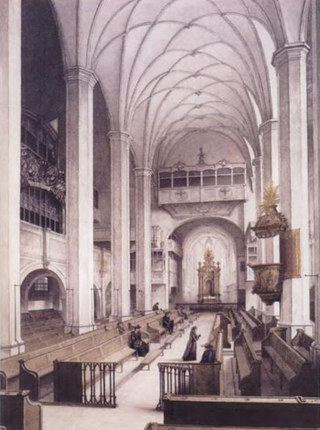
Johann Sebastian Bach composed the church cantata Was frag ich nach der WeltBWV 94 in Leipzig for the ninth Sunday after Trinity and first performed it on 6 August 1724. It is a chorale cantata, based on the hymn by Balthasar Kindermann (1664) on a melody by Ahasverus Fritsch.
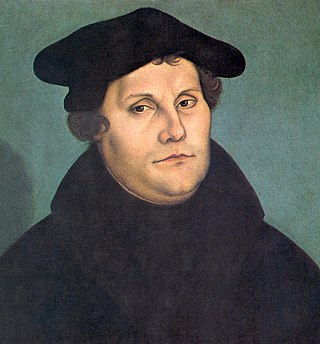
Gelobet seist du, Jesu Christ, BWV 91, is a church cantata by Johann Sebastian Bach. He wrote the Christmas cantata in Leipzig in 1724 for Christmas Day and first performed it on 25 December 1724. The chorale cantata is based on the hymn "Gelobet seist du, Jesu Christ" (1524) by Martin Luther.

Jesus Christus ist um unsrer Missetat willen verwundet is a St Mark Passion which originated in the early 18th century and is most often attributed to Reinhard Keiser. It may also have been composed by his father Gottfried or by Friedrich Nicolaus Bruhns. Johann Sebastian Bach produced three performance versions of the Passion, the last of which is a pasticcio with arias from George Frideric Handel's Brockes Passion. There are two other extant 18th-century versions of the Passion, both of them independent of Bach's versions. The Passion was performed in at least three cities in the first half of the 18th century: in Hamburg in 1707 and 1711, in Weimar around 1712, and in Leipzig in 1726 and around 1747.

Johann Sebastian Bach's St Matthew Passion, BWV 244, is structured on multiple levels: the composition is structured in three levels of text sources and by the different forms that are used for musical expression.
















